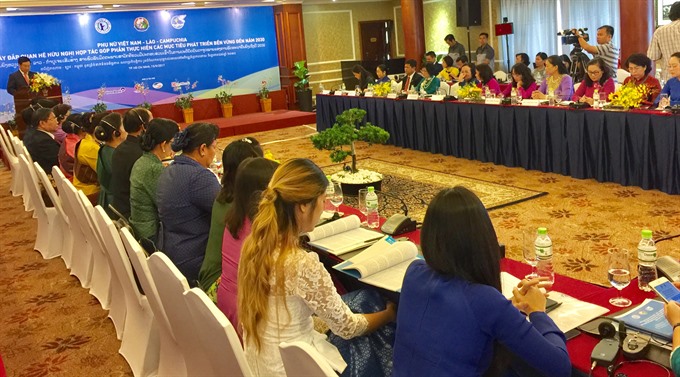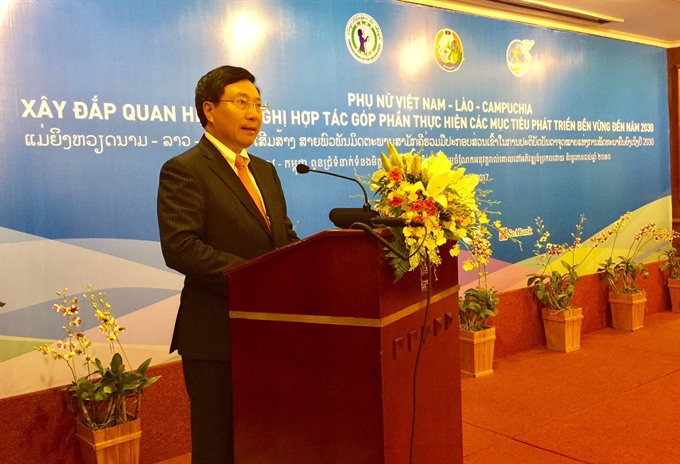 Society
Society

" />Economic growth can only be sustained if the status of women is improved, Deputy Prime Minister Phạm Bình Minh said at a Việt Nam-Laos-Cambodia women’s forum held yesterday in HCM City.
 |
| More than 80 women delegates from Việt Nam, Laos and Cambodia participated in the Việt Nam-Laos-Cambodia women’s forum on promoting friendship and cooperation to help realise the UN’s Sustainable Development Goals by 2030. VNS Photo Bồ Xuân Hiệp |
HCM CITY — Economic growth can only be sustained if the status of women is improved, Deputy Prime Minister Phạm Bình Minh said at a Việt Nam-Laos-Cambodia women’s forum held yesterday in HCM City.
The forum was held to promote friendship and cooperation among the countries to realise the UN’s Sustainable Development Goals by 2030.
The deputy PM, who is also Việt Nam’s Minister of Foreign Affairs, said that peace, cooperation and development would continue to be “the dominant trend in the coming time, of which women play a vitally important role”.
“The UN agenda to 2030, the first historic agreement reached globally on sustainable development, in which the central task is gender equality, is bringing unprecedented opportunities to promote cooperation and to enhance the role of women,” Minh said.
The Asia-Pacific region continues to be an engine of global growth while the ASEAN community is implementing a vision to 2025 with a focus on people, of which women are an indispensable part of the community.
“Therefore, the contributions of women, especially in our three countries, will help build a stronger ASEAN Community and realise the ASEAN Vision,” he said.
However, challenges remain, including the risk of war and conflict around the world. Global economic growth has become unstable and is slowing down, requiring economies to seek new growth drivers.
Meanwhile, 90 per cent of global economies continue to maintain at least one discriminatory policy or regulation on women. Around 2.3 million women worldwide do not have access to the internet.
In the ASEAN region, gender inequality is causing a loss of 18 per cent of ASEAN’s GDP each year, which is equal to half a billion US dollars, according to Minh.
The forum was organised on the occasion of the 50th anniversary of diplomatic relations between Việt Nam and Cambodia, the 55th anniversary of diplomatic relations between Laos and Việt Nam, and the 40th anniversary of the signing of the Việt Nam-Laos Friendship and Cooperation Treaty.
Nguyễn Thị Thu Hà, chairwoman of the Việt Nam Women’s Union Central Committee, said that women’s unions from Việt Nam, Laos and Cambodia were planning to increase the number of exchanges and educational programmes among the countries.
Speaking on the sidelines of the forum, Men Sam An, Cambodian deputy prime minister, who is also head of the Cambodian Women for Peace and Development Association, said: “Cambodia and Việt Nam have cooperated in poverty reduction, vocational training for women, as well as health, education and anti-trafficking activities, contributing to the building of a border of peace, friendship and development.”
Inlavanh Keobouphanh, president of the Laos Women’s Union, told Việt Nam News that the Lao government had long enacted a policy of promoting gender equality “as enshrined in the constitution and laws as well as legal documents, including related international treaties and the introduction of policy documents.”
Both Cambodian and Lao delegates said they hoped that Việt Nam would continue assisting the three countries’ women to carry out exchanges, share experiences and promote women’s roles in each nation’s development. — VNS
 |
| Deputy PM Phạm Bình Minh speaks at the Việt Nam - Laos - Cambodia Women’s Forum on promoting friendship and cooperation to help realise the UN’s Sustainable Development Goals by 2030. VNS Photo Bồ Xuân Hiệp |




